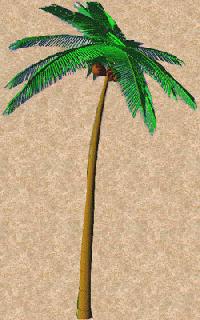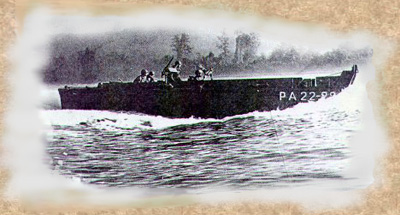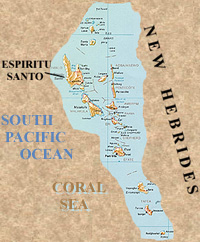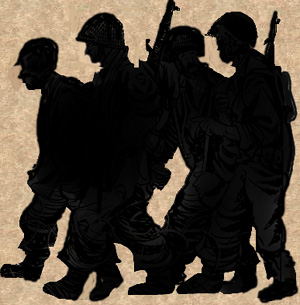
| CHAPTER EIGHT |
SOLOMON ISLANDS: Part I
LANDING ON TULAGI - BATTLE OF SAVO ISLAND:
August 7 - 10, 1942
 he 1st Division landed on Guadalcanal and they encountered practically no opposition. We, the attached
units of the 2nd Division, were assigned a group of smaller islands, Gavutu, Tanambogo, and Tulagi, about
twenty miles from Guadalcanal, across Skylark Channel. Here the Japs resisted fiercely.
he 1st Division landed on Guadalcanal and they encountered practically no opposition. We, the attached
units of the 2nd Division, were assigned a group of smaller islands, Gavutu, Tanambogo, and Tulagi, about
twenty miles from Guadalcanal, across Skylark Channel. Here the Japs resisted fiercely.
G Battery was in reserve and put to work unloading supplies. Now I got my first sight of the enemy. The
body of a young Japanese was thrown into a ditch and garbage tossed over him and passing Marines used
the trench as a latrine. I was sickened, but not as disgusted as I should have been... or as I am now.
At midmorning the pace of unloading really speeded up. A Jap task force had been spotted heading in our
direction from Rabaul and since we were protected by only a few destroyers and cruisers, the success of our
invasion was deemed very uncertain. In the afternoon, Jap torpedo bombers arrived and sank a transport
about 100 yards away from the Jackson. Our fantail gunners shot one torpedo bomber into the sea as it
skimmed toward us. It was only a few hundred feet from the ship when it crashed into the channel.
That night, as we scurried back and forth, trying to get supplies ashore, we could see the gun flashes and
hear the explosions. We hopefully assumed that Jap ships were being sunk, but it was our fleet that was
caught in a cross-fire. Our ships were silhouetted by the burning Elliott and were being clobbered.
The battle of Savo Island was another naval disaster for us. Four heavy cruisers were sunk: US Cruisers: the
Astoria, Quincy, and Vincennes and the Australian cruiser,Canberra. The US
Chicago was badly damaged but managed to get away. Jap torpedo bombers attacked both days and
sank one supply ship and damaged two troop transports. The carrier Yorktown had been sunk during
the battle of Midway in early June; most of our battleships were resting at the bottom of Pearl Harbor; and
now we had lost a good percentage of our remaining fleet. These were dark days for the swabbies as well as
the Marines.
All hands worked through the night in a frenzied attempt to get everything possible unloaded before the
whole convoy was sunk. Unknown to us, the decision had been made to pull out of the Solomons with
whatever ships were still afloat. It was a dismaying sight for the Marines on Tulagi when daylight came and
they discovered that all the ships had fled during the night. They were embittered and felt abandoned, as in
fact, they were. My knowledge of their reactions comes secondhand since I was one of the lucky ones that
got away.
Tactically, the retreat of the navy was probably the correct decision. However, released accounts of the
Solomon Islands campaign cite documents showing inter-service rivalries, fuzzy, expedient decisions, high-
brass ego trips, and apparent callous disregard for the troops involved. It seems there was a panic situation.
The Japs had control of the entire western Pacific. We had suffered two major naval disasters, Pearl Harbor
and Savo, so why risk the loss of any more warships to support a tenuous beach-head that was doomed
anyway? Naturally, we felt betrayed. Ghormley and Turner were were the admirals commanding the task
forces; "Gutless Ghormley" and "Timid Turner" were fervently cursed. In fairness, I must admit that there
were probably more sailors killed in those two days than Marines.
Hindsight, fifty years later, has convinced me that I was leading a charmed life during those years. At every
point, when decisions beyond my control were made, I ended up with assignments that were better, safer,
and cleaner than the alternatives. Usually, at the time that the changes in my assignments were made, I felt I
was getting a bad deal, but it invariably turned out that I was placed in the right place, at the right time, to
ensure my ultimate survival. I certainly never expected to ever describe Tarawa and Iwo as "right"
places!
 Five men were assigned to each Higgins boat. The little boats clustered alongside the ship while cargo nets
full of crates and boxes were lowered. The nets were unloaded and sent back up for another load. When the
little boat could hold no more we would take off for the Tulagi beach, over a mile away. On one trip our
boat received rifle fire from a dinky little island as we chugged by. Months later, I was to live on that same
small islet and experience some of my best war-time duty.
Five men were assigned to each Higgins boat. The little boats clustered alongside the ship while cargo nets
full of crates and boxes were lowered. The nets were unloaded and sent back up for another load. When the
little boat could hold no more we would take off for the Tulagi beach, over a mile away. On one trip our
boat received rifle fire from a dinky little island as we chugged by. Months later, I was to live on that same
small islet and experience some of my best war-time duty.
Every four hours, crews were switched. Men who had been working in the hot, stinking holds loading the
nets were given the relatively more pleasant duty in the boats. Here, at least, there was fresh air and a brief
rest as the boat was in transit between ship and shore. I was sweating in a hold aboard the Jackson when the
signal was given and the ships upped anchors and scurried away. About one third of G battery was aboard,
the rest were either on Tulagi or in the landing boats when the fleet pulled out. These men were dispersed
among H and I batteries and it was months before the battery was reunited.
We experienced a pretty scary two-day voyage, constantly lined up along the rail, straining our eyes trying
to spot the periscopes of Jap subs. It seemed as if we were on constant "general quarters"; no scuttlebutt
about where we were going to hide from the Japs but we were damn sure that we weren't heading back to
San Diego. The area was swarming with Jap ships and planes. It was painfully apparent that our only
protection was a couple of old obsolete destroyers and the anti-aircraft gun set up on our fantail.
Our little convoy reached the New Hebrides about August 12, 1942. Since we were forbidden to keep
diaries all these dates are approximate but I can use the historically recorded landing dates in order to
extrapolate forward or backward and get a soft chronology. I've never been particularly good with dates and
considerable memory cells have undoubtedly atrophied during the 45 intervening years.
 The Jackson anchored in a narrow channel off Espiritu Santo, in the New Hebrides Islands, about 700 miles
from Guadalcanal. Santo is the biggest Island... about forty miles wide and almost seventy miles long. It is
mostly rugged mountains, some about 6,000 feet elevation. The relatively flat areas along the coastline were
covered with plantations of coconut and cacao -- cocoa trees.
The Jackson anchored in a narrow channel off Espiritu Santo, in the New Hebrides Islands, about 700 miles
from Guadalcanal. Santo is the biggest Island... about forty miles wide and almost seventy miles long. It is
mostly rugged mountains, some about 6,000 feet elevation. The relatively flat areas along the coastline were
covered with plantations of coconut and cacao -- cocoa trees.
Part of the Instrument Section was put ashore on Santo in a remote area at the mouth of a large river, about
two miles from the nearest plantation. We had orders to locate and survey a camp site. At the time, I wasn't
thrilled to be selected as one of this party. This felt like another abandonment to me. There was some sense
of security being on board ship and the old President Jackson was starting to feel as familiar as home by
now. I felt that it offered my one slim chance to escape from the Japs.
We left the now beloved transport and went ashore in a rubber raft, which we got to keep. Our supplies
were hauled ashore in a Higgins boat. We got a pyramid tent, plotting table, drawing instruments, compass,
aiming circle -- a junior grade transit, blankets, our rifles, ammunition, hand grenades, and several cases of
"C" rations.
"C" Rations deserve special mention. A "ration" consisted of two sealed cans, each about the size of a soup
can. Can "A" contained four little round biscuits (sawdust must have been the principal ingredient), a
package of coffee powder, another packet of what was supposed to be lemonade, and a bar of hard
chocolate which looked like grey soap. It's taste lived up to expectations. There were three types of "B"
cans: beef stew, beef hash, and a gluey something with hard beans as the only identifiable substance. Since
we seldom had a chance to heat these treats, the hash was the most desired, or least repulsive, item since
it had a much smaller gasket of hard grease on top than the other two.
In between the "good: times and the "bad" times were seemingly endless stretches of homesickness and
boredom. We all had long personal lists of what we craved: Fresh cold drinking water without chlorine, warm
fresh water showers, clean socks, clean underwear, clean white bed-sheets, cold milk, cool nights, fresh
bread, soft music, a cold crisp apple, a big tall glass of "Green River" pop with lots of ice cubes,
Ma's beef pot roast with dark brown gravy and hot buttered noodles, ......
Later in the war, these delights were replaced by "K" Rations. Not much better. "K's" came in heavily
waxed, khaki-colored cartons about the size of a Cracker Jack box. It took a very sharp knife to fight the
box open. The rewards were barely worth the effort. I remember some not-too-bad hard candy but it still
makes me shudder to recall the little cans of bacon and eggs... grey, glutinous, grainy, and almost inedible.
Only incipient malnutrition and near starvation allowed us to swallow these abominations. As I read this
now, I have to reluctantly admit that the rations were not quite as horrible as I have indicated. It is a
serviceman's duty to bitch about the food.
There were five of us detached and sent ashore: Lt. Southworth, an old hand by now, Red brown, DeCaro,
Andy and me. We considered ourselves the cream of the G Battery Instrument section. The ship departed to
discharge what was left in the cargo holds and the rest of the troops on another island in the archipelago,
someplace where the Japanese fleet wasn't presently threatening. I vividly recall the lost feeling and the lump
in my throat when the ship disappeared around the end of the island. But things looked brighter when we
explored our new surroundings.
Santo was as close to the romantic Hollywood version of the South Pacific as I ever came. There were no
enticing, bare-breasted, nubile maidens with swaying hips, warm kisses, fragrant flower leis... but there
were swaying palms, warm surf, a sweet fragrant scent in the air. At night the stars seemed so much closer.
The sweet redolence was somewhat counterbalanced by the reek from the copra sheds where coconut meat
was spread out to dry and cure. We made sure our camp was located up-wind and far away from these
native enterprises. I'm now certain that my fondness for this island was a strongly influenced by what it didn't
have, as by what charms it did have. It didn't have Japs.
 We were instructed to locate a desirable campsite and defensive positions inland from the beaches. The ships
were expected to return within ten days. . if they didn't get sunk. Since we were able to complete all the
required surveying by the end of the second day, we were free to hike into the interior of the island where
we traded for pineapples, papayas, limes and bananas. The natives loved those awful C-Rations; we craved
the fresh fruit. They were reputed to be cannibals and head-hunters. Maybe so, but they were the most
courteous people I've ever met. Also, the blackest. They wore little G-strings made from woven leaves and
most were adorned with shell necklaces and bracelets. They were short, muscular, bandy-legged, and shiny
coal-black. None of them displayed the runny sores that we saw on the natives of many of the other islands
we visited. One book I read stated: "The Solomon Islands are the "black" center of the world. The natives
of these islands are blacker than any other race on earth." I must disagree. The Solomon Islanders are much
browner and paler than the New Hebridians.
We were instructed to locate a desirable campsite and defensive positions inland from the beaches. The ships
were expected to return within ten days. . if they didn't get sunk. Since we were able to complete all the
required surveying by the end of the second day, we were free to hike into the interior of the island where
we traded for pineapples, papayas, limes and bananas. The natives loved those awful C-Rations; we craved
the fresh fruit. They were reputed to be cannibals and head-hunters. Maybe so, but they were the most
courteous people I've ever met. Also, the blackest. They wore little G-strings made from woven leaves and
most were adorned with shell necklaces and bracelets. They were short, muscular, bandy-legged, and shiny
coal-black. None of them displayed the runny sores that we saw on the natives of many of the other islands
we visited. One book I read stated: "The Solomon Islands are the "black" center of the world. The natives
of these islands are blacker than any other race on earth." I must disagree. The Solomon Islanders are much
browner and paler than the New Hebridians.
The natives we encountered near the beach were accustomed to seeing white men but those we met in the
interior were very curious about us. They always indicated that they wanted us to undress so that they could
see if we were white all over. The first few times this happened I was uncomfortable being surrounded by a
crowd of grinning natives. They would point and touch and then jabber something to the rest of their group.
These unintelligible comments always seemed to provoke great laughter and glee. At first, this was
disconcerting but we got used to shedding our clothes and running around like the natives.
After two weeks passed and our ship had not returned, we feared the worst. Maybe the five of us had been
forgotten and we'd spend the whole war here. Maybe the rest of our lives? But finally, the good old
President Jackson returned with its cargo holds empty. We were joined by about sixty other Marines who
had been separated from their outfits when the ships made their hasty departure from Skylark
Channel.
Except for Red Brown, DeCaro, and a few others who were considered too valuable to be risked, we were
organized into a "Raider" unit. My memory is still a bit hazy on some of these points, probably because I
subconsciously don't want to recall how doomed I felt at this time. It's ironic that some of my greatest "up"
times and some of my worst "down" times occurred back-to-back here on an island whose name in
translation means "Holy Spirit". My spirit certainly got a vigorous workout here on Espiritu Santo but I
question that much "holiness" was involved.
One of FDR's sons, James, dreamed up the concept of a Marine equivalent to the British Commandos... an
elite, superbly trained, special force that could sneak up in the night, strike a smashing blow to the enemy
and slip off into the darkness carrying their dead and wounded with them. A daring concept, and a story
about a "Raider's" raid would make very exciting reading. It's sure as hell not an outfit that I would ever
volunteer for. The Marine Corps brass resisted this idea. They maintained that the entire Marine Corps was a
superbly trained, elite force.
But, if your father happens to be President, your ideas are certain to be taken seriously. The "Raiders" were
formed and didn't meet with any startling successes during the war. Colonel Carlsen's Raider Battalion had a
flawed victory on their raid on the Makins, small islands north of Tarawa. They were supposed to destroy
the Jap facilities on Big Makin and then attack Little Makin. They were badly shot up at Big Makin and were
forced to pull out leaving some of their men behind. This was a real blot on the honor of the Corps. Marines
never abandon their buddies! The raid on Little Makin was aborted.
Some smart-ass aide-de-camp evidently decided that all those unassigned, rag-tag, orphan Marines who
were in the Hebrides should be made "instant Raiders". Presto! We were formed into an infantry platoon.
We were to train for a month, then be transported by submarine to a Jap listening post, presumably, Little
Makin Island. We'd slip ashore, do a Rambo number on the Japs and then paddle back out into the sea to be
picked up by a submarine. We were never told what we were supposed to do if the sub couldn't find us. It
sure would have been one hell of a rowing job to reach Hawaii or South America.
Being involuntarily volunteered into such a fierce Gung-Ho group was bad. Much worse was the fact that I
was made first scout. This honor is greatly diminished by the realization that a scout's primary function is to
range out ahead of the troops and draw the enemy fire. When the scout gets shot, the rest of the platoon has
a chance to scurry for cover. A Marine scout in the South Pacific in 1942 had to be at the very bottom of the
insurance life-expectancy tables. I was absolutely certain that I would not survive the raid.
During daylight drills we paddled rubber rafts out to a narrow reef which was supposed to represent a
submarine. This was not great fun but it wasn't too tough. Next, we had night drills and had to operate in the
dark. At first we rowed around in the channel, which was relatively calm. Then we were set adrift in the
open sea and we had to paddle around in the dark with waves threatening to swamp us at any moment. After
an hour or so of this we were allowed to climb back aboard the landing boat. Prior to this, I detested
Higgins boats. Now I loved them. These were terrifying experiences. The fact that I couldn't swim wasn't a
factor. We were so loaded down with ammo, rifles, pistols and knives that even a porpoise would have sunk
like a stone. This was the only time that I really seriously contemplated accidentally shooting myself in the
foot so I would have to be relieved of my scouting duties.
 We had training hikes in the jungle in pitch darkness. Sometimes it was so dark that each man in line had to
hold onto the cartridge belt of the man ahead of him to keep from getting lost. As number one scout, I was
always the first man in line and had to pick out the route. One night, I got the platoon hopelessly lost. When
we stumbled onto the bank of a deep river that was at least three miles from our goal, the platoon leader
called a halt and we squatted there, wet and miserable in rain, until daylight. Lt. Southworth, usually a
mild-mannered guy, was really pissed. When it got light he led the platoon back to camp. He was just as lost
in the jungle as I was in the dark, but now he had to demonstrate his leadership abilities. I didn't care. I
hoped that he was mad enough to relieve me of my job as scout but that didn't happen.
We had training hikes in the jungle in pitch darkness. Sometimes it was so dark that each man in line had to
hold onto the cartridge belt of the man ahead of him to keep from getting lost. As number one scout, I was
always the first man in line and had to pick out the route. One night, I got the platoon hopelessly lost. When
we stumbled onto the bank of a deep river that was at least three miles from our goal, the platoon leader
called a halt and we squatted there, wet and miserable in rain, until daylight. Lt. Southworth, usually a
mild-mannered guy, was really pissed. When it got light he led the platoon back to camp. He was just as lost
in the jungle as I was in the dark, but now he had to demonstrate his leadership abilities. I didn't care. I
hoped that he was mad enough to relieve me of my job as scout but that didn't happen.
There were drills at the river where we learned how to use our machetes to hack bamboo into four-foot
lengths, then use our belts and shoelaces to tie them in bundles. Our rifles and clothes were lashed to these
rafts and we'd push them ahead of us as we dog-paddled across the river. I didn't mind this so much. It was
kind of fun.
A Jap task force was sighted heading in our direction. Their presumed targets were the islands of New
Hebrides, New Caledonia, and/or the Fijis. We spent frantic days and nights digging machine gun
emplacements and foxholes along the beaches and fall-back positions farther back inland. We knew that we
were powerless to stop a landing but we were supposed to inflict as much damage as possible and retreat
slowly. If we were lucky enough to survive we were instructed to head for the hills and hide out with the
natives. As it happened, the Japs were reinforcements for the Jap troops on Guadalcanal and they never
came within a hundred miles of us.
Fortunately, soon after this scare the Little Makin raid was again aborted and our platoon of reluctant
Raiders was disbanded. We were loaded aboard ship and steamed back to the Solomons to rejoin our
regiment. G Battery was finally reunited and set up on the islands of Gavutu and Tulagi.
Here again, I lucked out.



Memoirs Title Page
Tipi's Retreat

Copyright 1996 by /\/\ / ( /-/ = // =


| Memoirs Title Page | Tipi's Retreat |

Copyright 1996 by /\/\ / ( /-/ = // =